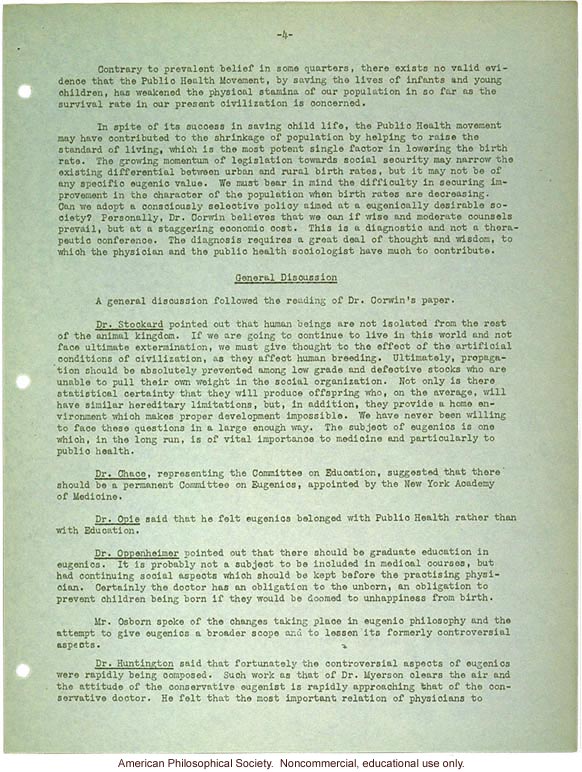[page number] -4- [end page number]
Contrary to prevalent belief in some quarters, there exists no valid evidence that the Public Health Movement, by saving the lives of infants and young children, has weakened the physical stamina of our population in so far as the survival rate in our present civilization is concerned.
In spite of its success in saving child life, the Public Health movement may have contributed to the shrinkage of population by helping to raise the standard of living, which is the most potent single factor in lowering the birth rate. The growing momentum of legislation towards social security may narrow the existing differential between urban and rural birth rates, but it may not be of any specific eugenic value. We must bear in mind the difficulty in securing improvement in the character of the population when birth rates are decreasing. Can we adopt a consciously selective policy aimed at a eugenically desirable society? Personally, Dr. Corwin believes that we can if wise and moderate counsels prevail, but at a staggering economic cost. This is a diagnostic and not a therapeutic conference. The diagnosis requires a great deal of thought and wisdom, to which the physician and the public health sociologist have much to contribute.
General Discussion
A general discussion followed the reading of Dr. Corwin's paper.
Dr. Stockard pointed out that human beings are not isolated from the rest of the animal kingdom. If we are going to continue to live in this world and not face ultimate extermination, we must give thought to the effect of the artificial conditions of civilization, as they affect human breeding. Ultimately, propagation should be absolutely prevented among low grade and defective stocks who are unable to pull their own weight in the social organization. Not only is there statistical certainty that they will produce offspring who, on the average, will have similar hereditary limitations, but, in addition, they provide a home environment which makes proper development impossible. We have never been willing to face these questions in a large enough way. The subject of eugenics is one which, in the long run, is of vital importance to medicine and particularly to public health.
Dr. Chace, representing the Committee on Education, suggested that there should be a parmanent Committee on Eugenics, appointed by the New York Academy of Medicine.
Dr. Opie said that he felt eugenics belonged with Public Health rather than with Education.
Dr. Oppenheimer pointed out that there should be graduate education in eugenics. It is probably not a subject to be included in medical courses, but had continuing social aspects which should be kept before the practising physician. Certainly the doctor has an obligation to the unborn, an obligation to prevent children being born if they would be doomed to unhappiness from birth.
Mr. Osborn spoke of the changes taking place in eugenic philosophy and the attempt to give eugenics a broader scope and to lessen its formerly controversial aspects.
Dr. Huntington said that fortunately the controversial aspects of eugenics were rapidly being composed. Such work as that of Dr. Myerson clears the air and the attitude of the conservative eugenist is rapidly approaching that of the conservative doctor. He felt that the most important relation of physicians to


